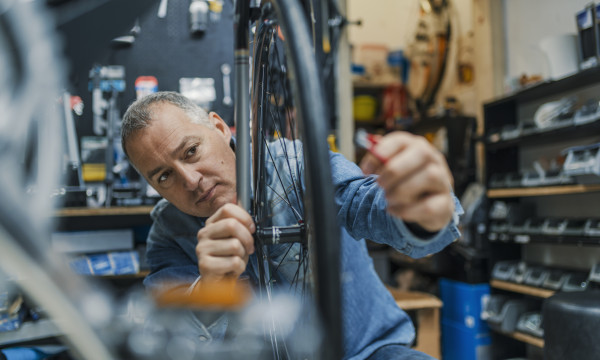SBA loans: What’s right for my business?

SBA loans are business loans issued by participating lenders, usually banks, and partially guaranteed by the Small Business Administration. Their flexible terms, low down payment requirements, and competitive interest rates can make them invaluable to a new or growing business. In this article, we’ll dive into specific types of SBA loan, enabling you to better identify how your banker and an SBA loan might benefit you.
There are several types of Small Business Administration Loans available — each with its own parameters and criteria — and the best SBA loan for you will depend on your unique circumstances.
Standard SBA 7(a) loan program
The 7(a) loan program is SBA’s most popular loan program, and loan proceeds can be used for the following business purposes:
- Working capital
- Machinery and equipment
- Purchase of land and building, including construction and/or renovations
- Inventory, supplies, and materials
- Furniture and fixtures
- Establishing a new business or assisting in the acquisition, operation, or expansion of an existing business
- Refinancing of existing business debt
- Revolving lines of credit under the SBA Express program
Here are the details of the standard SBA 7(a):
- The maximum loan amount is $5 million.
- Generous loan terms are available of up to 25 years for real estate and 10 years for equipment.
- They have significantly lower down payment or equity requirements (as low as 10%) than traditional commercial loans.
- The SBA requires that the lender collateralize — or guarantee — the loan to the maximum extent possible up to the loan amount. So, if a business’s fixed assets do not fully cover the amount of the loan, the lender must take available equity in the personal real estate of the principal(s) or business owner(s) as collateral.
- Rates can be fixed or variable and are tied to the prime rate as published in the Wall Street Journal or the SBA optional peg rate as published in the Federal Register, but they may not exceed the SBA’s maximum rates.
- The maximum SBA guaranty percentage is 85% for loans $150,000 or less and 75% for loans greater than $150,000.
7(a) small loan program
The SBA 7(a) small loan is the name for an SBA 7(a) loan in the amount of $350,000 or less. These loans are credit scored by the SBA, and creditworthiness will be decided based on a blend of consumer credit data, business credit data, borrower financials, and application contents.
- The SBA permits a qualified lender to determine loan eligibility.
- The maximum loan amount is $350,000.
- Generous loan terms are available of up to 25 years for real estate and 10 years for equipment.
- They have significantly lower down payment or equity requirements (as low as 10%) than traditional commercial loans.
- Lenders and borrower can negotiate the interest rate. Rates can be fixed or variable and are tied to the prime rate as published in the Wall Street Journal or the optional peg rate as published in the Federal Register, but they may not exceed the SBA’s maximum rates.
- The maximum SBA guaranty percentage is 85% for loans $150,000 or less and 75% for loans $150,001 to $350,000.
SBA Express
The SBA Express program is an expedited lending program which allows lenders to follow their own internal lending policies and utilize their own lending forms. Borrowers still need to meet the SBA’s eligibility requirements, complete certain SBA forms, and ensure loan proceeds will be used for eligible purposes.
- The maximum loan amount is $500,000.
- Generous loan terms are available of up to 25 years for real estate and 10 years for equipment.
- They have significantly lower down payment or equity requirements (as low as 10%) than traditional commercial loans.
- Revolving lines of credit are available up to 60 months with a 60-month term-out period (120 months total), with no draws permitted during the term-out period.
- The maximum SBA guaranty percentage is 50%.
- Lenders and borrower can negotiate the interest rate. Rates can be fixed or variable and are tied to the WSJ Prime rate as published in the Wall Street Journal or the optional peg rates published in the Federal Register, but they may not exceed the SBA’s maximum rates for the SBA Express program.
- The process more closely resembles a conventional loan process, with lenders primarily using their own forms and procedures for loan processing.
- Collateral may not be required for loans up to $25,000.
SBA 504 loan program
The CDC/504 loan program provides long-term, fixed-rate financing for major fixed assets that promote business growth and job creation. Under this program, the Small Business Administration partners with Certified Development Companies (CDCs), which are community-based partners who promote economic development within their communities to provide long-term (10, 20, or 25 years), fixed-rate financing for major fixed assets.
The maximum loan amount for a 504 loan is $5 million. For certain energy projects, the borrower can receive a 504 loan for up to $5.5 million per project for up to three projects, not to exceed $16.5 million total.
SBA 504 loans can only be used for fixed assets, such as:
- Real estate, both existing buildings and new construction
- Improvements and upgrades, which can include street grading, parking lots, landscaping, etc.
- Remodel or conversion of existing facilities
- Purchase of machinery and equipment
There are three parts to a 504 loan:
- Part one: A loan is secured with a first mortgage from a private-sector lender covering up to 50% of the project cost.
- Part two: A second mortgage is secured with a junior lien from an SBA Certified Development Company covering up to 40% of the cost. (This is 100% backed by the SBA).
- Part three: A contribution from the small business owner is made to cover at least 10% equity for the cost of the project. An additional 5% is required for special purpose facilities or start-up businesses.
With SBA 504 loans, borrowers can finance up to 90% of the project. To be eligible for a 504 loan, a business must operate for profit and fit the size guidelines set by the SBA for the 504 program. This means tangible net worth can’t exceed $15 million, and average net income over the past two years cannot exceed $5 million after taxes. In addition, 504 loans can’t be made to businesses that speculate or invest in rental real estate.
For even more information about 504 loans, check out 504 loan resources from sba.gov and NEDCO, or read this article where we tackle some common SBA loan questions.
Ready to meet with a small business loan expert? We’re here to here to help!
Learning Center articles, guides, blogs, podcasts, and videos are for informational purposes only and are not an advertisement for a product or service. The accuracy and completeness is not guaranteed and does not constitute legal or tax advice. Please consult with your own tax, legal, and financial advisors.




